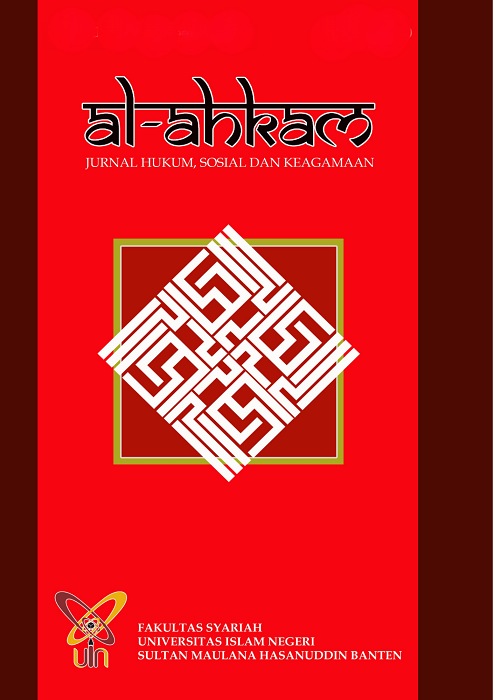Implementation of Sacrificial Worship in the Government Environment Pamekasan Regency Islamic Law Perspective
DOI:
https://doi.org/10.37035/ajh.v19i1.7880Abstract
This study aims to determine the implementation of sacrificial worship in the Pamekasan Regency Government Environment. This research uses empirical legal research methods that use a type of socio-legal research with an Islamic law approach. The data collection used semi-structured interviews, non-participant observations, and document studies. The primary data source is from respondents who are directly involved in the implementation of sacrificial worship in the Pamekasan Regency Government. The rest is sought from secondary data in the form of a review of books related to this research topic. The sacrificial animals collected came from Regional Apparatus Organizations and vertical agencies in Pamekasan. The sacrificial animals were collected above the names of each agency without the name of the employee as the person who sacrificed even through the agency. Two problems are the main study in this study, namely: First, how to carry out sacrificial worship within the Pamekasan Regency Government. Second, how is the review of Islamic law on the implementation of sacrificial worship within the Pamekasan Regency Government. And this study produced, first; the implementation of sacrificial services carried out within the Pamekasan Regency Government in the form of collecting, slaughtering, and distributing them according to the rules set by the Pamekasan Regency Government. Second; because sacrificial animals are collected and slaughtered on behalf of agencies and not on behalf of their employees, according to Islamic law it does not include sacrificial worship in accordance with the provisions of sharia law but is counted as almsgiving
Downloads
References
Ajib, Muhammad. Fiqih Kurban Perspektif Mazhab Syafi’i. Jakarta: Rumah Fiqih Publishing, 2019.
Arfa, Faisar Ananda, and Watni Marpaung. Metodologi Penelitian Hukum Islam. 2nd ed. Jakarta: Prenadamedia Group, 2018.
Bisri, Cik Hasan. Model Penelitian Fiqh. Jakarta Timur: Prenada Media, 2003.
Hamdan, Rasyid. Bagian Pertama Kurban Dan Persepktif Islam. Jakarta: Jakarta Islamic Center, 2011.
Hanafī, ‘Abd al-Ganī al-Gunaimī al-. Al-Lubāb Fi Syarḥ al-Kitāb. Vol. 3. 4 vols. Beirut: al-Maktabah al-Ilmiyyah, 1993.
Irwansyah. Penelitian Hukum; Pilihan Metode & Praktik Penulisan Artikel. Edited by Ahsan Yunus. Yogyakarta: Mirra Buana Media, 2020.
Jayusman. “Tinjauan Hukum Islam Terhadap Ibadah Kurban Kolektif.” Al-’Adalah x (2012): 435.
Jazīrī, ’Abd al-Raḥmān al-. Kitāb al-Fiqh ‘Alā al-Mażāhib al-Arba’ah. 7th ed. Vol. 1. 4 vols. Beirut: Dār Iḥyā` al-Turāṡ al-’Arabī, 1986.
Karimi, Ahmad Faizin. Kurban Kekerasan Berbingkai Agama? Analisis Teori Kambing Hitam Rene Girard. Gresik: Muhi Press, 2012.
Kementerian Agama RI. Al-Qur`an Terjemah & Tajwid. Bandung: Sygma Creative Media Corp., 2014.
Munawwir, Ahmad Warson. Kamus Al-Munawwir; Arab-Indonesia. 1st ed. Yogyakarta: Pustaka Progresif, 1984.
Qarāfī, Syihāb al-Dīn Aḥmad bin Idris al-. Al-Żakhirah. Vol. 4. Beirut: Dār al-Garab al-Islāmī, 1994.
Qazwīnī, Abū ‘Abdullāh Muḥammad bin Yazīd al-. Sunan Ibn Mājah. Edited by Muḥammad Fuād ‘Abdul Bāqī. Vol. 2. 2 vols. Beirut: Dār al-Iḥyā` al-Kutub al-‘Arabiyyah, n.d.
Rozalinda. Fiqh Ekonomi Syaria. Jakarta: PT. Raja Grafindo Persada, 2016.
Sâbiq, Sayyid. Fiqh al-Sunnah. 4th ed. Vol. 3. 3 vols. Beirut: Dâr al-Fikr, 1983.
Sugiyono. Metode Penelitian Kualitatif Kuantitatif dan R&D. Bandung: Alfabeta, 2010.
Suyūṭī, Jalāl al-Dīn ‘Abd al-Rahmān bin Abū Bakar al-. al-Dībāj ‘Alā Ṣaḥīḥ Muslim bin al-Ḥajjāj. Edited by Abū Isḥāq al-Ḥawīnī al-Aṡarī. Vol. 5. 6 vols. Saudi Arabia: Dār Ibn ‘Affān, 1996.
Tuasikal, Muhammad Abduh. Panduan Qurban. Yogyakarta: Pustaka Muslim, 2015.
Downloads
Published
Versions
- 2023-07-27 (2)
- 2023-07-01 (1)
How to Cite
Issue
Section
License
Copyright (c) 2023 Hosen, Siti Mudmainah

This work is licensed under a Creative Commons Attribution-ShareAlike 4.0 International License.










